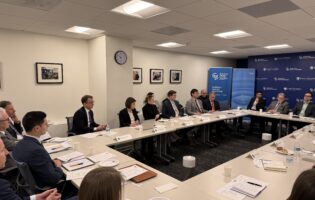Reconciliation in International Affairs
On September 27, 2011, the American-German Institute (AGI) hosted a seminar on “Reconciliation in International Affairs: Lessons from Europe and Northeast Asia.” Henning Borggräfe and Bongseok Han, both Harry & Helen Gray/AGI Reconciliation Fellows, presented their research, followed by comments by Dr. Lily Gardner Feldman, Director of AGI’s Society, Culture & Politics Program andHarry and Helen Gray Senior Fellow. The seminar was supported by the Harry & Helen Gray Culture and Politics Program.
Henning Borggräfe began by presenting his research project, “Compensation as a Mechanism of Reconciliation? Lessons from the German Payments for Nazi Forced and Slave Labor.” Compensation is considered an essential tool in reconciliation, and can bring a sense of closure to victims. The case of Nazi slave labor is useful because it can serve as an example for other instances of compensation and can help us understand how compensation is a useful tool for reconciliation. According to the foundation established to administer the victims’ claims, the “Foundation Remembrance, Responsibility, and Future,” there are 1.6 million former slave laborers in 100 countries. These victims demanded that Germany pay its debts—withheld wages and damages—which Germany did for both moral (right an injustice) and pragmatic (avoid becoming a pariah state and protect its economy) reasons. Reactions of former slave laborers varied, from feeling that the wrong was acknowledged to wanting confrontation in court, indicating that while compensation could lead to reconciliation, it could also disappoint or even have no effect.
Bongseok Han presented a case for reconciliation in Northeast Asia with his project “A Proposal for Historical Reconciliation: Focusing on the Dokdo Movement of Korean Americans in the Washington Area.” The territorial dispute between Japan and Korea over the Dokdo islands demonstrates the difference in perceptions among generations and how minority groups can exert pressure on a third country to push for reconciliation in Northeast Asia. The so-called 1.5 generation of Korean Americans (born in Korea but immigrated to the U.S. prior to the age of 17) is well-placed to do just that. Educated in and familiar with both countries, bilingual, and integrated into mainstream society in the U.S., the 1.5 generation identifies with Korean interests—including the Dokdo protection movement—and wants to promote their cause not by influencing Korean policy, but by influencing U.S. policy toward the region.
Connecting the two cases of reconciliation, Dr. Lily Gardner Feldman pointed out that historical disputes can be worked on or even resolved years later. Territorial issues in the German-Polish and German-Czech cases were “bracketed,” and initially not included in other areas of reconciliation. In contrast, Dokdo is a major issue between Japan and South Korea, precluding other major reconciliation efforts. Reconciliation requires more than just an apology, which is especially true in the Japanese case. Germany’s steps—apologize, offer compensation, build other relationships—have allowed it to successfully pursue reconciliation with its former victims; Japan has barely started the process. Third parties—in both cases, the U.S.—have a role to play in encouraging reconciliation but in Japan, unlike in Germany, third parties have not pushed the government to develop policies of reconciliation. Regardless of other actors or parties, however, it is the victims and the perpetrators who must reconcile.







